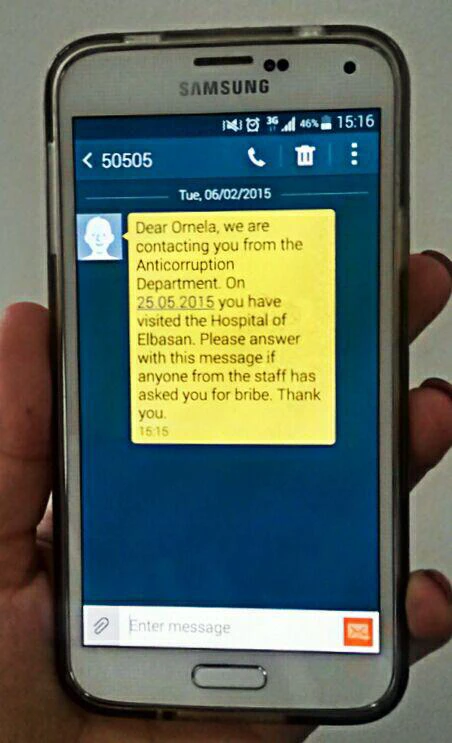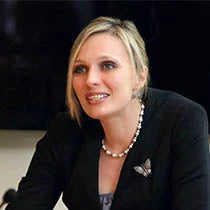
Albanian citizens who recently received treatment at a state-run hospital are likely to receive a text message that reads something like this: “Hi, I am Bledi Cuci, Minister of State responsible for anti-corruption. Our records indicate that you recently received care in a state hospital.
Could you kindly tell me if you were asked to pay a bribe? Reply is free. Thank you for your time. ”
The SMS campaign, supported by The World Bank and implemented by the Ministry of State for Local Issues and Anti-Corruption, was launched on March 9, 2015.
As of early June, it has reached more than 33,500 citizens in a country of three million. About 20 percent have responded, reporting many service delivery problems.
“The doctors are always late and the corruption continues as always. Without giving away money, no one takes care of you,” read one response. Others complain of lack of cleanliness or the absence of medicines: “No, they didn't ask for bribe, but we had to buy the drugs outside of the hospital because they didn't have any.”
Citizens obtaining services at the three property registration offices report unpredictable service delivery time, processing delays, long queues and either implied or overt requests for bribes: “I was not asked for bribe, but the problem in the property offices is that no one sticks to the deadlines given by the law.”
Unlike the anti-corruption hotlines, this initiative is preventive. Although the government also tracks down specific corruption cases reported, the primary purpose of this mechanism is to identify trends: Does a particular property registration office or a hospital ward get consistently more complaints?
What is the usual nature of complaints to help plan a response? Can a weak manager be identified?
The goal of proactively reaching out to citizens is to fight corruption by building trust in government. Hospitals and property registration services were chosen because they were identified in a recent UNODC survey as those with highest levels of corruption in Albania.
Low trust in government leads not only to informal means of obtaining services and less willingness to pay taxes , it also leads to lower resources for the government to provide public services, thus completing a vicious cycle of mistrust and corruption.
By proactively collecting citizen feedback and using it for management actions, this vicious cycle can be broken.
The Bank team brought this innovative program to Albania from Punjab, Pakistan, where it was first initiated. More than seven million citizens have been contacted and around a million responded over the last three years.
The chief secretary office has used the feedback from some 10,000 citizens contacted every day to regularly monitor the performance of the district officers. The Program is now being further scaled up at the federal level.
The current Albanian Prime Minister, Edi Rama, made his name as Mayor of Tirana through a well-known initiative that aimed to improve citizen welfare, build trust, and fight corruption by making it literally visible to the people that the government cared about their well-being.
No wonder that a text message campaign serving similar purpose has a strong appeal to high-level decision makers in Albania. Today, the Prime Minister is keen on expanding this innovation into more services.
Response from citizens is enthusiastic. One such reply noted that after receiving care from the Durrës hospital: “I have been in the hospital before, but this time you could feel the change. No one asked for bribe.” Another wrote from Korça, “No way, the behavior of the doctors was very correct. It was the first time they were showing such support.”
While it is clearly too early to declare success, a pattern is emerging in both Albania and Pakistan. A substantial percentage of citizens consistently appreciate that the state is proactively reaching out to them to ask about their welfare: “Hello, Mr. Minister. Yes, I was in the hospital in Durrës and I’m satisfied with the service. No one asked for bribe,” responds a grateful citizen to the Minister’s message. “Thank you for asking.”



Join the Conversation